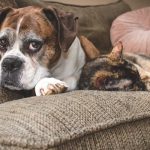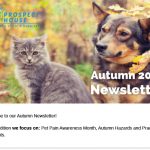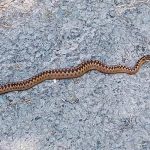Autumn is a beautiful time of year, as the leaves fall and we look to cosy time at home. Our pets enjoy refreshing walks in the cooler air, playing in piles of leaves and crashing through muddy puddles. However there are some things that can harm our pets at this time of year. This is a summary of some Autumn dangers to be aware of for our companions
- Dark nights – as the days get shorter we are often walking our dogs in the dark. Make sure you and your pet are visible using aids like reflective leads or coats and flashing lights or collars. Cats will also be spending more time outside in the dark, which can lead to a rise in road traffic injuries. Try to keep cats indoors during the dark hours if possible, or at least at peak traffic times in the morning and evening.
- Acorns and conkers – both of these can cause harm to curious pets who might eat them. In smaller amounts they are likely to cause stomach irritation, vomiting and diarrhoea. Eaten whole they can also cause intestinal blockages. Both acorns and conkers contain toxic substances that can lead to more serious complications and organ damage when eaten repeatedly or in large amounts. Keep an eye on your dogs in wooded areas and try to avoid them eating anything from the ground.
- Fallen leaves and fruit – while they are great fun to play in try to avoid dogs eating fallen leaves. As they decay they are a source of bacteria and moulds that can cause stomach upsets and in some cases more serious symptoms. Fruit falling from trees can also seem tasty to our companions but it quickly becomes mouldy and often contains pips or –
- Mushrooms – you will see many types of pretty mushrooms on your Autumn walks. Some of these can be toxic if eaten, even in very small amounts, causing organ damage and seizures. If you think your pet may have eaten part of a mushroom take a picture of the type they have eaten for identification purposes and seek veterinary advice immediately
- Rodent poisons – these can pose a risk to pets at all times of year but bait is put out more often in the Autumn. There are several types of poisons used against rodents with different modes of action. If you are concerned your pet may have eaten some bait or a poisoned rodent try to find out the name of the bait. It’s colour can often be useful in identifying the type. As the effects can be delayed it is better to get veterinary advice as soon as possible.
- Parasites – both fleas and ticks seem to be more active in the Autumn months so make sure your furry friend is up to date with their parasite control. Slugs and snails are the intermediate host for some types of lungworm and can often be found on the wet grass at this time of year. If your pet likes to leave toys outside or snack on grass in the garden it is worth considering monthly lung worm prevention
- Chocolate – we enjoy warming up with our hot chocolate and indulging in Halloween treats but it is important to keep these away from curious companions. Theobromine in chocolate can be dangerous to pets, causing stomach upsets and in larger amounts excitation and seizures.
- Antifreeze – as Autumn progresses and the temperatures drop we start to use more antifreeze for our vehicles. This is particularly a problem with cats who often investigate garages and sheds. Antifreeze is reported to have a sweet taste and licking even small amounts can cause serious kidney damage and seizures. Be careful to clean up any spills and store any antifreeze safely away from your pets.
- Glow sticks – often used to light up the Autumn evening but can attract the attention of pets. If they manage to bite or chew them the chemicals can be irritant to the mouth, throat and stomach. While they are not usually seriously toxic they can cause a lot of discomfort to animals that ingest them
- Fireworks – as much as we enjoy the spectacle of Fireworks our pets can find them terrifying. During firework season try to avoid walking dogs after dark and keep cats inside. More information on preparing your pet for firework night can be found in a special article here.
Look out for fallen fireworks or sparklers in the days following displays as they contain chemicals that can be harmful
- Arthritis – cold damp weather can exacerbate joint problems such as arthritis. Sometimes the symptoms can be gradual and hard to pick up. If you think you are seeing a change in your pet’s mobility get in touch for a check up. You can read more about arthritis and how to spot it on our advice page






